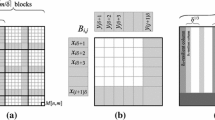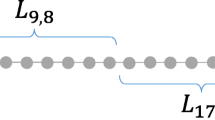Abstract
We present three explicit schemes for distributingM variables amongN memory modules, whereM=Θ(N 1.5),M = Θ(N 2), andM=Θ(N 3), respectively. Each variable is replicated into a constant number of copies stored in distinct modules. We show thatN processors, directly accessing the memories through a complete interconnection, can read/write any set ofN variables in worst-case timeO (N 1/3),O(N 1/2), andO(N 2/3), respectively for the three schemes. The access times for the last two schemes are optimal with respect to the particular redundancy values used by such schemes. The address computation can be carried out efficiently by each processor without recourse to a complete memory map and requiring onlyO(1) internal storage.
Similar content being viewed by others
References
H. Alt, T. Hagerup, K. Mehlhorn, and F. P. Preparata. Deterministic simulation of idealized parallel computers on more realistic ones.SIAM Journal of Computing, 16(5):808–835, 1987.
Y. Aumann and A. Schuster. Improved memory utilization in deterministic PRAM simulations.Journal of Parallel and Distributed Computing, 12:146–151, 1990.
E. R. Berlekamp.Algebraic Coding Theory. McGraw-Hill, New York, 1968.
M. Dietzfelbinger and F. Meyer auf der Heide. Simple, efficient shared memory simulations.Proc. 5th ACM Symp. on Parallel Algorithms and Architectures, pages 110–119, 1993.
D. K. Gifford. Weighted voting for replicated data.Proc. 7th ACM Symp. on Operating System Principles, pages 150–159, 1979.
D. Gorenstein.Finite Groups. Harper and Row, New York, 1968.
K. T. Herley. Efficient simulations of small shared memories on bounded degree networks.Proc. 30th IEEE Symp. on Foundations of Computer Science, pages 390–395, 1989.
K. T. Herley. Space-efficient representations of shared data for parallel computers.Proc. 2nd ACM Symp. on Parallel Algorithms and Architectures, pages 407–416, 1990.
K. Herley and G. Bilardi. Deterministic simulations of PRAMs on bounded-degree networks.SIAM Journal on Computing, 23(2):276–292, April 1994.
D. R. Hughes and F. C. Piper.Design Theory. Cambridge University Press, Cambridge, MA, 1985.
D. J. Kuck. A survey of parallel machine organization and programming.ACM Computing Surveys, 9(1):29–59, March 1977.
F. Luccio, A. Pietracaprina, and G. Pucci. A new scheme for the deterministic simulation of PRAMs in VLSI.Algorithmica, 5(4):529–544, 1990.
K. Mehlhorn and U. Vishkin. Randomized and deterministic simulations of PRAMs by parallel machines with restricted granularity of parallel memories.Acta Informatica, 21:339–374, 1984.
M. Morgenstern. Natural bounded concentrators.Combinatorica, 15(1):111–122, 1995.
A. Pietracaprina and F. P. Preparata. AnO(√n)-worst-case-time solution to the granularity problem. In K. W. Wagner P. Enjalbert, A. Finkel, editor,Proc. 10th Symp. on Theoretical Aspects of Computer Science, pages 110–119, Würzburg, February 1993. LNCS 665, Springer-Verlag, Berlin.
A. Pietracaprina and G. Pucci. Tight bounds on deterministic PRAM emulations with constant redundancy. In J. V. Leeuwen, editor,Proc. 2nd European Symp. on Algorithms, pages 319–400, Utrecht, September 1994, LNCS 855, Springer-Verlag, Berlin.
A. G. Ranade. How to emulate shared memory.Journal of Computer and System Sciences, 42:307–326, 1991. See alsoProc. 28th IEEE Symp. on Foundations of Computer Science, pages 185–194, 1987.
R. H. Thomas. A majority consensus approach to concurrency control for multiple copy databases.ACM Transactions on Databases Systems, 4(2):180–209, 1979.
E. Upfal and A. Widgerson. How to share memory in a distributed system.Journal of the ACM, 34(1):116–127, 1987.
Author information
Authors and Affiliations
Additional information
This paper was partially supported by NFS Grants CCR-91-96152 and CCR-94-00232, by ONR Contract N00014-91-J-4052, ARPA Order 8225, and by the ESPRIT III Basic Research Programme of the EC under Contract No. 9072 (Project GEPPCOM). Results reported here were presented in preliminary form at the 10th Symposium on Theoretical Aspects of Computer Science (Würzburg, Germany, 1993), and at the 5th ACM Symposium on Parallel Algorithms and Architectures (Velen, Germany, 1993).
Rights and permissions
About this article
Cite this article
Pietracaprina, A., Preparata, F.P. Practical constructive schemes for deterministic shared-memory access. Theory of Computing Systems 30, 3–37 (1997). https://doi.org/10.1007/BF02679451
Received:
Accepted:
Published:
Issue Date:
DOI: https://doi.org/10.1007/BF02679451




